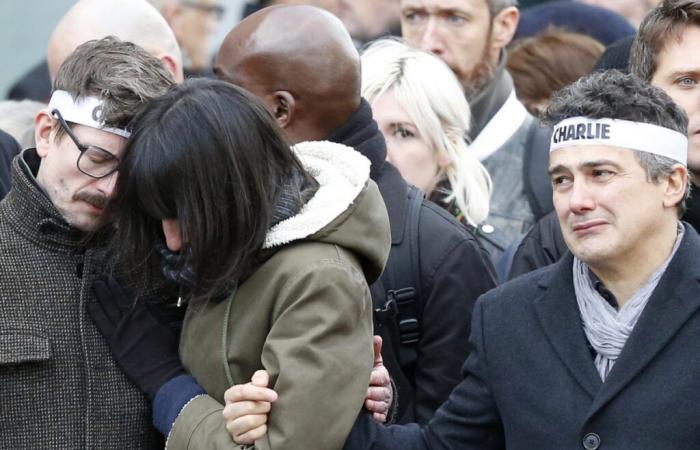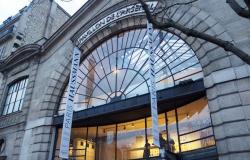Keystone-SDA
Ten years later, the time for contemplation: the jihadist attacks against Charlie Hebdo and the Hyper Cacher store were commemorated on Tuesday with seriousness and emotion in Paris, while the satirical newspaper appears “indestructible” on the front page of a special number.
This content was published on
January 7, 2025 – 2:31 p.m.
(Keystone-ATS) These ceremonies open a heavy memorial sequence, while France experienced a series of jihadist attacks in 2015, including those of November 13 in Paris and Saint-Denis. Late Tuesday morning, at the same time as the killings on rue Nicolas-Appert in the 11th arrondissement, the survivors of the editorial staff, the families of the victims and many personalities gathered.
Names of the victims pronounced, laying of wreaths, bells to the dead, minute of silence, Marseillaise: the sequence was sober, in a neighborhood cordoned off by the police. Hands crossed, the director of Charlie Hebdo Riss, himself seriously injured in 2015, looked at the facade for a long time, thoughtfully, noted an AFP journalist.
Emmanuel Macron, former President François Hollande, in office at the time, the mayor of the capital Anne Hidalgo, Prime Minister François Bayrou and several members or former members of the government were present. “The sadness is the same, the emotion too,” François Molins, Paris prosecutor at the time, declared on France 2. “The Charlie spirit” has “never left me,” assured Anne Hidalgo.
The Head of State came to speak for a few minutes with the families, away from the press. From January 7 to 9, 2015, the brothers Chérif and Saïd Kouachi and Amedy Coulibaly targeted freedom of expression, law enforcement and the Jewish community, during “coordinated” attacks, although claimed by two separate entities. , Al-Qaeda in the Arabian Peninsula (Aqpa) and the Islamic State (IS) organization.
Terrorism Memorial
Twelve people, including eight members of the Charlie Hebdo editorial team, lost their lives in the attack on the weekly by the Kouachi brothers, French people of Algerian origin. After two days of tracking, they were shot dead by the GIGN, an elite group of the gendarmerie, in a printing house in Dammartin-en-Goële (Seine-et-Marne), where they had taken refuge.
Two police officers in Paris and Montrouge, as well as four people of Jewish faith in a kosher store at Porte de Vincennes, were also killed during these three days of terror. To these victims was added the former webmaster of Charlie Hebdo, Simon Fieschi, seriously injured in the attack and died last October.
-The ceremonies continued on Boulevard Richard Lenoir, where police officer Ahmed Merabet was shot dead by the Kouachi as they fled. Then in front of the Hyper Cacher store, where the same ritual with wreath laying and minute of silence was repeated. On Wednesday, the city of Montrouge will organize a tribute to municipal police officer Clarissa Jean-Philippe, killed by Amedy Coulibaly, also author of the Hyper Cacher attack.
Near the store, stars of David and the inscription “Jew” were found on Monday on buildings in Saint-Mandé and Vincennes (Val-de-Marne). A leader of the Rouen synagogue announced that she had filed a complaint against X for public incitement to hatred after the discovery of anti-Semitic tags. “The sequence has never closed” and “the battle against this anti-Semitic Islamism continues”, reacted the president of Crif (Representative Council of Jewish Institutions of France) Yonathan Arfi.
On Monday, before French ambassadors, President Emmanuel Macron hoped that there would be “no respite in the fight against terrorism”. The Head of State wants to maintain the Terrorism Memorial project, a place of homage to all the victims of terrorism in France and abroad, threatened with abandonment, we also learned from a source close to the case.
Ten years to the day after the killing, Charlie Hebdo also released a special 32-page issue with a circulation of 300,000 copies. On the front page, he says he is “indestructible!” ”, with the drawing of a jovial reader sitting on an assault rifle, reading this “historic” newspaper.
“Fight for freedom”
A joyfully anarchist and anticlerical newspaper created in 1970 from the ashes of Hara-Kiri magazine, Charlie Hebdo had been the target of jihadist threats since the publication of caricatures of the Prophet Mohammed in 2006.
These attacks provoked worldwide emotion and gave birth to a support slogan that has remained famous: “Je suis Charlie”. On January 11, 2015, demonstrations brought together nearly 4 million people across France, with many heads of state and government in the Parisian procession.
Ten years later, Charlie Hebdo published in its special issue a series of caricatures on the theme #LaughingatGod. The weekly launched an international competition at the end of 2024 inviting people to draw “anger against the influence of all religions”.
The newspaper “embodies a fight for freedom”, underlined Fabrice Nicolino, member of the surviving editorial of January 7, 2015, Tuesday on franceinfo. And to describe an editorial office today protected by “a large metal door”, a series of “airlocks”, a “room teeming with cops” or even a “panic room” in the event of an attack.






